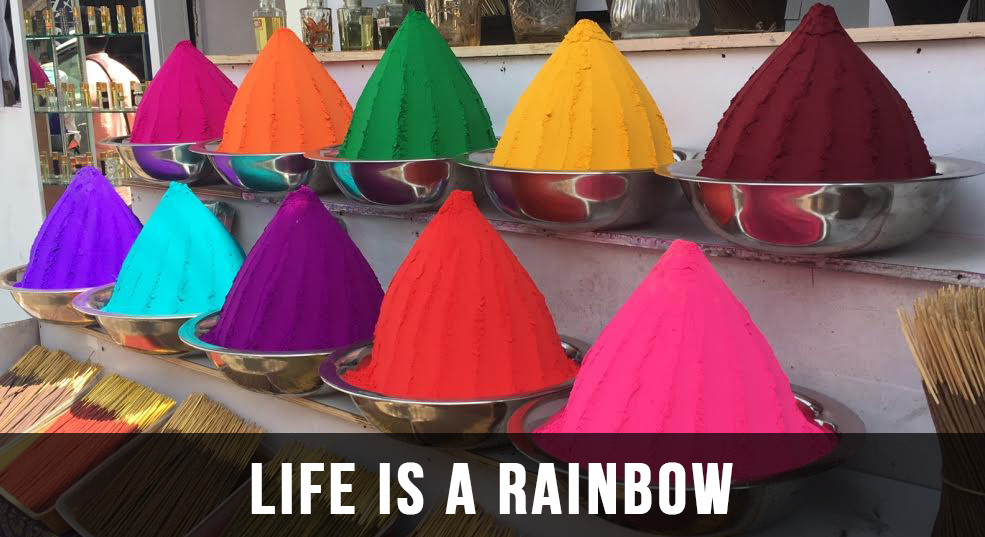Colorful Language: meanings of colors in Chinese
Language learning is always an exercise in cultural understanding. Recently, as I was listening to various Qing Wen episodes, I began to get a better sense of the importance of the concept of colors and their various representations in Chinese!
This helped me realize how dependent spoken language can be on visual connections. This strong visual connection is crucial as it adds vividness and brightness to our everyday speech and helps us sound more like a native speaker.
The names of colors is one of the earliest things we will learn in any language. So you may be thinking: I already know all there is to know about colors! But in Chinese, colors can have a strong cultural significance that you are perhaps unaware of!
RED 红色 (hóngsè)
Red is associated with luck and prosperity. This is why money is placed in red envelopes during many Chinese holidays. Chinese brides also wear a red wedding dress and Chinese New Year Slogans are also all mostly red. It is an extremely common and lucky color in China. You’ll notice lots of marketing campaigns use the passion of fiery red to their advantage!
Idioms and Phrases that use Red:
红红火火 (hóng hóng huǒ huǒ) (literally: red red fire fire): This phrase is used to describe a full and flourishing life, one that is full of energy and excitement!
面红耳赤 (miàn hóng ěr chì) (literally: red face and red ears): This idiom describes someone who is very embarrassed! Of course we all know when someone is TRULY embarrassed their entire face may erupt in a blush!
WHITE 白色 (bái sè)
White, in contrast, is often associated with a lack of life, which is why it is so often used in funerals. However, now the overwhelming media presence regarding western style weddings means there are many more Chinese brides that choose to wear a white wedding dress… but this is a modern phenomenon.
Idioms and Phrases that use White:
一穷二白 (yī qióng èr bái) (literally: first poor second white): This describes someone who is culturally backward and does not have much money. The white here signifies the emptiness of their cultural knowledge.
白璧无瑕 (bái bì wú xiá) (literally: white jade without imperfections): Meaning spotless and perfect. In this phrase, white signifies purity rather than emptiness.
YELLOW 黄色 (huáng sè)
Yellow is associated with the earth, and is symbolic of the Chinese as a people because they believe they are descendants of the Yellow Emperor. It is an imperial color and therefore was always used in the robes of the Emperors. Interestingly, it is also associated with inappropriate material. A, “yellow book” can often infer material is pornographic in nature!
Idioms and Phrases that use Yellow:
人老珠黄 (rén lǎo zhū huáng) (literally: old people, yellow pearls): This phrase is used particularly towards older women, referring to the fact that pearls will yellow and become less beautiful with age. Therefore implying that the older one gets, the less desirable one becomes.
面黄肌瘦 (miàn huáng jī shòu) (literal: yellow face, thin body): This phrase visually describes a sick person. It is in reference to someone who is very ill.
青黄不接 (qīng huáng bù jiē) (literally: spring yellow not received): This translates to, “the autumn will not last until spring”, which means that there are low resources and one may not be able to make ends meet.
BLACK 黑色 (hēi sè)
Black is associated with water as an element, showing its moveable, untrustworthy nature. Therefore it is associated with the darker side of things such as destruction, evil, cruelty and misfortune.
Idioms and Phrases that use Black:
黑白分明 (hēi bái fēn míng) (literally: black and white separate clearly): It means to have a clear distinction between black and white. This can be used ideologically to say that someone knows certain boundaries clearly, or more literally to describe neat and clear handwriting.
颠倒黑白 (diān dǎo hēi bái) (literally: to turn over black and white): This means that someone or something is misrepresenting the facts and changing the truth.
GREEN 绿色 (lǜ sè)
Green is associated with health and harmony. Especially in recent years, it is associated with organic produce and eco-friendliness. While these are all good things, you have to be careful because, independently, a green hat is associated with infidelity. If a man wears a green hat, it implies that your wife has cheated on you!
Idioms and Phrases that use Green:
戴绿帽子 (dài lǜ mào zǐ) (literally: wear a green hat): Meaning to be cheated on by one’s wife.
花花绿绿 (huā huā lǜ lǜ) (literally: many flowers lots of green): Brightly colored and gaudy. This is always used in the negative.
So as you can see, colors in Chinese are full of life and meaning! These few phrases are just the beginning of how you can incorporate color into your language. It’s a wonderful way to brighten up your everyday speech. Happy learning!
Visit the Qing Wen channel or check out one of the Playlists
- Qing Wen Grammar
- Qing Wen Vocab Beginner
- Qing Wen Culture Beginner
- Qing Wen Grammar Intermediate
- Qing Wen Vocab Intermediate
- Qing Wen Culture Intermediate
- Qing Wen Vocab Advanced
Giulia Mazzola
Favourite ChinesePod lesson: "The frog prince in the well".
Latest posts by Giulia Mazzola (see all)
- Where to start reading Chinese Science Fiction - October 20, 2017
- Going Organic: Find the safest food in China - August 30, 2017
- 3 Ways to incorporate Chinese Medicine ideas into your life - July 18, 2017



